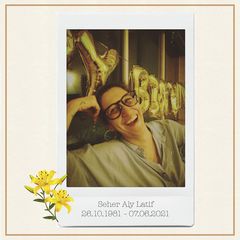We live at a time of unpleasant change. The pandemic has caused a dismal unfamiliarity to creep into the cherished familiar, changing relationships and common occurrences. Hugs, the most healing of mammal interactions, require a total sterilisation of bodies. Text messages and phone-calls, earlier anticipated eagerly as forms of communication that kept us abreast with the lives of loved ones and world news, are now harbingers of grief.
I knew Seher was in hospital; in ICU. But I assumed she would make it. I’d had a glimpse of her feisty spirit, that she hid well under her warm smile and gentle demeanour, when we worked together on Bhaag Beanie Bhaag; she was my producer and thus my employer. I would tease her often, because I liked seeing her laugh. I’d refer to her as ‘Seth ji’; she would threaten not to sign my cheques. It never occurred to me that Seher may pass away, even when her close friend Shivani added the words ‘tough situation’ to every enquiry I made about Seher’s health. Sure it was a tough situation, but it was Seher. She was a tough cookie!
In a surreal but perhaps entirely obvious coincidence, I was on camera, in a Zoom interview, with a co-actor, promoting a just-released short film, when a text beeped on my phone. Since the other actor was answering I muted my window and opened it—Devastating news. Seher (Latif) passed away.
I stared at my phone numbed. I had spoken to Shivani the night before and she had said that even though Seher was on the ventilator, her vitals were stable. I replied mechanically, “Oh no!”
I had missed the interviewer’s question. I blinked. She repeated. She was smiling warmly. There was an opportunity to give a witty reply. I couldn’t rise to the occasion. I gave a generic reply and luckily the interview ended. I had five minutes to take in the tragedy, before the next interview began. My hairstylist started dabbing my face and fluffing my hair. Seher is no more. There were no tears. Just palpitations that came and ebbed.
It wasn’t an unfamiliar feeling. Just three nights ago, while at dinner at a friend’s house, I had interrupted a genuinely funny story narrated with some flair when my eye caught a text message from my best friend—My father passed away just now.
“Oh My God,” I exclaimed, disrupting dessert and the bonhomie. I made apologies and excused myself. The palpitations came as I furiously texted back and forth with my bestie. I had met uncle only once but I knew what he meant to my friend.I texted reassuring platitudes that I knew would be of little comfort. I went back to dinner in a haze.
Back at my promotions, my break was over and the next interviewer was ready. I, too, was ready with my template answers, my template smile and my template giggle. The next time I opened my phone, there were numerous updates on the WhatsApp group of my cousins. A cousin, who is getting married in December, posted her gorgeous ‘Save The Date’. She was jokingly chiding us to reply more enthusiastically. Everyone began to comply. Something snapped in me. “My friend died today. Sorry. Unable,” I replied in a sullen manner. A flurry of apologies followed from her.
“It’s okay, life must go on,” I replied, feeling ashamed and petty. I posted the customary happy, excited, party emojis and stickers.
I thought again of poor Seher. I felt like an imposter—doing promotions for a film the day my friend died, getting all dressed up and sitting in front of cameras and giggling instead of locking myself up in the bathroom and allowing myself to acknowledge how crushed I felt. What a terrible occupational hazard—the need to perform for the outside world irrespective of one’s internal world. Was it the curse of every single person in public life or was I the only one cheating on my grief? Or, are these times just so brutal that life is forced to go on, without even a moment to blink away tears, because the death statistics are now populated with too many people we know?
The writer is an award-winning Bollywood actor and sometime writer and social commentator.


